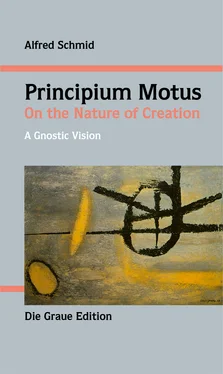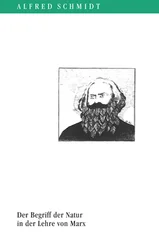All hoarding of knowledge that relates only to reason and intellect merely opens in us the gate to the power of doubt, which always stands between man and nature. Ever since, man has understood that he has been stripped of his glory and forced to fight, by the sweat of his brow, to regain knowledge lost, as if he were arduously digging over the field with a spade, in search of treasure.
That is why all science grounded in a relationless intellect always remains synonymous with doubt, which constantly feels for the wounds that it has inflicted on nature. In contrast, gnostic knowledge serves no purpose. It is nature’s self-revelation in the spirit. For this reason I was deeply touched when back then Adolf Portmann 3, the eminent biologist, recognized that the abundance of colours, patterns and shapes that nature lavishes did not serve the preservation of the self or the species, but was “far from the eye of a conspecific, sexual partner, or hereditary enemy” a “self-presentation, which we must call undirected ". And he continues: “The actual phenomenon in its undirected being is inherently self-presentation. In extreme cases it is directed neither towards conspecifics nor towards enemies. It is purely appearance in the light-space .”
These are the key words of our turning times, just like the words with which he concludes his work: “Perhaps it has been noticed that humanity’s loneliest great creations are in a similar fashion purely phenomena in the light of the spirit as the countless exquisite forms of plants and animals are phenomena in the light.”
Thus, it is for the purpose of gnostic knowledge that every splendour of nature has been created “ad maiorem Dei gloriam”, and our reading in its wonders is both pledge and warranty of our immortality.
*
Even though we here represent the perspective of the gnosis, we do not deny that logic and science are without doubt necessary wherever they attempt to reconstruct and comprehend natural events through reason and intellect, often supported by results from higher mathematics (which I call “paramathematics” 4). Every gnostic vision has its analogue in a perception by the eye, and every prehension of reason and intellect in the sense of touch.
A conversation or a lecture can convey knowledge. Yet beyond that, a conversation can also lead to a communion in the cognitive act, an event that oscillates between spirit and love. Plato’s theory of forms and the “Symposium” belong together. On its own, every part would remain without tone, like the strings of a violin without its body: Logos and Eros are siblings.
Gnosis is never simply “attainment”, and he who is seized by it is not a “creator” but a receiver, just as no one would think that the whispers of love of Mozart’s music are just an “attainment”. Every effort of the will, every active agency, positively prevents our surrender to gnostic vision and only leads to confusion and error.
Then again, gnosis is not “manna” falling from heaven, and I am far from claiming the infallibility of a vision if it misses its hour or bears witness merely to the cognizer. Also, that which is seen in the gnosis is initially rather veiled, or more precisely: it is something that only gradually unveils itself. Just as in a fog it is only bit by bit that we discern trees, houses and people, here too only outlines emerge initially, which only later reveal their complete shape.
That is why at the beginning no gnostic vision is free of turbidity, which later, following its own laws, begins to clear and settle, very much like cloudy water clears up on its own as soon as it is no longer disturbed. All this is achieved by time and that active non-action that we call “awaiting”.
Between the will-directed taking hold of nature by means of reason and intellect and its self-revelation in the gnostic vision, between the mindset of the logician and that of the gnostic, there is after all a deep difference in essence that today seems hardly bridgeable, but that will clear up on its own when the time has come …
*
Logic and gnosis become the more evident the more we understand how different the conditions are on which their works depend:
While the logician ’s work faces the danger of missing its goal,
for the gnostic it is conception that is at risk.
While the logician works as a restless seeker and tireless digger,
the gnostic works agitated and tensely waiting for “his hour”.
While the logician has doubts about his actions and thoughts,
the gnostic has doubts about his mission.
The last stretch of his intellectual path is full of impatience for the logician;
the period before “his hour” is torture for the gnostic.
The time of the logician is an “always”, and what he creates is the result of an arduous search and active agency; the “hour” of the gnostic resembles the weakness of a “letting-happen”.
The angel flies in the draught of expectation and stops to stay with those who have become masters in keeping still. But all encounters with the angel are a visitation and distress, primordial joy and terror. Rilke has seen this too in his later years, acknowledging in his first Duino Elegy:
“Who, if I cried out, would hear me among the angelic Orders? And even if one were to
Suddenly take me to his heart: I would perish through his Stronger existence. For beauty is nothing but the onset of terror, which we can just about bear, and we admire it so because it calmly disdains to destroy us. Every angel is terrible.”
*
Being dogmatic is, after all, of the essence of science: a fortification or stronghold that must defend itself against the flux that inheres in every inspiration. Yet since here there is no arbitrator, the Gnostic’s situation would be desperate if he did not invariably recover after many a detour his inner voice, which enables him to “know” what he believes, and to believe what he knows.
On that account I may be forgiven for putting such a strong emphasis on the Gnosis: it is simply a comforting soliloquy. Perhaps it may already be justified because of the advancement of knowledge I achieved in this Principium motus (which today must appear hardly believable), but certainly in view of the sand trickling away in the hourglass of my life …
I know, and do not kick against the pricks, that I will not live to see the time when my insights will have proved their worth. Burning in the flames or being forgotten in the catacombs of silence is, after all, an appropriate death for the gnostic heretic: it is his death!
And once again we find apposite words in Rilke, this time in his Book of Hours :
“OH LORD, give everyone his own death.
Dying, departing from the same life
That had love, meaning, and hardship.
FOR we are only the shell and the leaf.
The great death that everyone carries in himself,
That is the fruit around which everything revolves.”
The Principium motus is the last fruit that detaches itself from the tree of my life.
1Alfred Schmid, The Marvel of Light. An Excursus, East-West Publications 1984.
2Translator’s note: This quote is from the Second Dance Song in the third part of Nietzsche’s Thus Spoke Zarathustra.
3Adolf Portmann, "Unterwegs zu einem neuen Bild vom Organismus", in: Die Welt in neuer Sicht. Sechs Vorträge [A New Perspective on the World. Six Lectures], ed. Jean Gebser, Munich 1957, p 43 ff.
4Cf. The Marvel of Light, op. cit., p. 27-31.
Конец ознакомительного фрагмента.
Читать дальше












